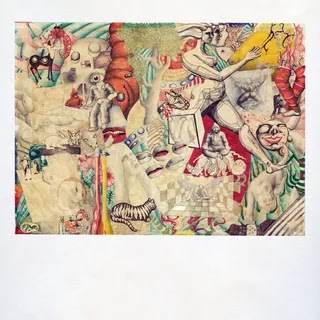Teen Suicide return with a sprawling new album that meditates on the anxiety and indifference of love and mortality.
You face your own mortality in little ways every day: blood on your knees after a fall, brakes that engage a moment too late, the feeling when you swim in the deep blue sea and suddenly a wave hits you in the face. Losing your breath can be the kind of event you barely register until it’s almost too late. That’s a simplified version of what happened to musician and producer Sam Ray last fall, when he suffered an asthma attack, stopped breathing, and woke up in the ICU. Jacked up on prescription steroids and worried there might not be another chance, he scrambled to complete the next album from his project Teen Suicide, honeybee table at the butterfly feast. It’s an alternately lovely and grating record, full of experiments that probably should’ve stayed on the cutting room floor.
For over a decade, Ray has been making homespun noise pop albums under various names, including Teen Suicide and American Pleasure Club, as well as an ambient project, Ricky Eat Acid. He mostly deals in introspection, sharing big thoughts about true love by way of emo-tinged vocals, tape hiss, and looping flutters of keys. On honeybee table, he meditates on love as he’s done on past records, always through the lens of mortality. Each track on the album daisy-chains its way back to a central thought: I almost fucking died. “new strategies for telemarketing through precognitive dreams” is a dreamy shoegaze song that concludes with reflections on watching the world end; on “groceries,” a trip to the store becomes a vehicle to explore Ray’s fears of amounting to nothing in the grand scheme of the universe.
It’s a lofty goal to write something profound about capital-D Death in the context of our unglamorous, everyday lives. In the best moments, he seems up for the task. The looped percussion and keys on “get high, breathe underwater (#3)” feel like being underwater, or watching life pass from within a dream. “I don’t wanna die/I don’t wanna live this way,” Ray sings, like a mantra. Occasionally he’ll pepper in a glimpse of the mythological, like a “big black bird” that “flies out of the flames.” He’s anxious but also blasé about his own mortality, a tension that produces some of the most interesting conceptual work on the record. It’s beautiful and messy to hear him ferment the world around him, to contemplate his relationship with being so tenuously alive.
Same goes for “i will always be in love with you (final),” the first song Ray wrote after he was discharged from the hospital. Made of tape hiss and acoustic guitar, it’s a heart-on-your-cardigan-sleeve emo-pop slow jam that should by all accounts be corny but ends up being tender and warm to the touch. Ray’s work has been compared to Phil Elverum’s projects, a connection that’s particularly clear here as he constructs small, intimate songs about mortality, love, and endurance.
honeybee is at its best when Ray sings unsparingly about facing death. But at 16 tracks, the album is overstuffed, and not in a substantive way. It’s just too long, like Ray decided to dump the entire contents of his hard drive. “violence violence,” a very out-of-place grindcore track, is an excruciating listen. “coyote 2015-2021” starts out pretty with its horns and wispy guitars but eventually falls stagnant. It’s one of the biggest problems Ray’s run into over the course of his career: His sprawling compositions capture the excitement of first-thought-best thought creativity but lack the direction that comes with a little curation and revision. Embarking on the journey with him, watching him figure it out in real time, can be both fascinating and frustrating. After all, not every idea is your best—nor, thankfully, is every day your last.










%20Music%20Album%20Reviews.webp)





0 comments:
Post a Comment